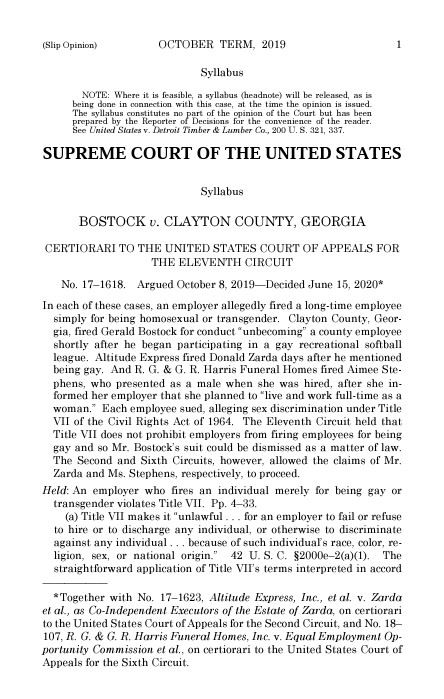
The Story
Partner Brian Sutherlandserved as lead counsel at the U.S. Supreme Court for Gerald Bostock, the plaintiff in the landmark case of Bostock v. Clayton County, Georgia, which banned workplace discrimination against LGBTQ people nationwide.
Prior to Bostock, employees could be fired on the basis of their sexual orientation or gender identity in several states, but Brian and his co-counsel persuaded the Supreme Court that Title VII of the Civil Rights Act of 1964 protects LGBTQ people from workplace discrimination too. The Bostock case not only affirms LGBTQ rights, but also human rights.
_Washington_Blade_by_Michael_Key.2310040557550.jpg)
Gerald Bostock was fired from his job at Clayton County as a volunteer coordinator for the court appointed special advocate (CASA) program, a nationwide program that provides volunteer advocates for the best interests of children in juvenile proceedings. Gerald was accused of mismanaging program funds after it was revealed that he participated in a gay recreational softball league in Atlanta. Believing that he was fired simply because of his sexual orientation but without an attorney to represent him, he filed a lawsuit under Title VII of the Civil Rights Act of 1964 seeking to vindicate his rights. Because of the importance for LGTBQ rights throughout the country, the Supreme Court’s decision was highly anticipated.
However, at that time, precedent held that Title VII did not cover discrimination based on sexual orientation, only discrimination based on sex. After becoming Gerald’s attorney, Brian Sutherland revised the lawsuit and argued that Title VII should be interpreted to cover sexual orientation discrimination for several reasons, including that a person cannot discriminate against someone because of that person’s sexual orientation without first considering that person’s sex. The Eleventh Circuit Court of Appeals rejected these arguments, but Brian Sutherland prepared and submitted a petition for certiorari to the U.S. Supreme Court, which granted review and consolidated Gerald’s case with another case from New York and one from Michigan involving gender identity discrimination.
Clayton County and the other employers argued strenuously that Title VII could not include sexual orientation discrimination because none of the legislators who passed it in 1964 could have expected it would be applied that way.
But Brian Sutherland and the other lawyers involved succeeded in persuading the U.S. Supreme Court that the plain language of the law should control. Writing for a 6-3 majority, Justice Neil Gorsuch agreed that “only the written word is the law, and all persons are entitled to its benefit.” The Court also explained in depth why a statute must be interpreted according to its plain language, regardless of whether those who passed the law might have expected that application, affirming a mode of analysis commonly referred to as “textualism.” Representing Gerald Bostock as lead counsel at the Supreme Court, Brian Sutherland authored the briefs that helped convince a 6-3 majority of the Court to hold that Title VII does in fact prohibit workplace discrimination based on sexual orientation and gender identity. He and the other lawyers involved were successful in persuading the Court that, even though Congress may not have expected the sex discrimination provision of Title VII to cover sexual orientation when it passed the law in 1964, proper statutory interpretation requires that it be interpreted that way. Writing for the majority of the Court, Justice Neil Gorsuch agreed, holding that “only the written word is the law, and all persons are entitled to its benefit.
Press
- In Georgia Case, High Court Holds LGBT Employees Are Protected by Sex Discrimination Law, Law.com, June 15, 2020
- Despite court victory, LGBT boosters gird for more fights in Ga. , The Atlanta Journal Constitution, July 10, 2020
- Gerald Bostock Feeling ‘Elated’ After Supreme Court Ruling Protecting LGBTQ Workers Against Discrimination, Hollywood Life, June 29, 2020
- "The Sports Kiki" Ep. 20: Gerald Bostock, Spotify, Jun 2020
- How support from gay softball teammates carried Gerald Bostock through historic Supreme Court win, Outsports, Jun 18, 2020
- Pride on ABC News Live: The Landmark Decision, ABC News, June 23, 2020
- A Historic LGBTQ Supreme Court Case and The Man Who Started It All, Buzzfeed, Jun 17, 2020
- Supreme Court sent 'clear message' with LGBTQ ruling, plaintiff Gerald Bostock says, NBC News, June 16, 2020
- Supreme Court bans LGBT employment discrimination, Good Morning America, June 16, 2020
- Leaders at forefront of historic LGBT Supreme Court ruling share their stories, ABC News, June 16, 2020
- Supreme Court protects LGBTQ civil rights, ABC News, June 15, 2020
- Clayton County case at heart of Supreme Court ruling on civil rights protections for LGBT community, News-daily.com, June 15, 2020
- Supreme Court plaintiff Gerald Bostock on landmark victory for LGBTQ rights: 'My heart is just full of gratitude', Yahoo.com, June 17, 2020
- Supreme Court bans LGBT employment discrimination, ABC News, June 15, 2020
- Atlanta Firm Advocating for LGBT Protections | Rare Intervention Grant | Verrilli Leads for Sandy Hook Victims | Big Law Arbitration Clauses, Law.com, October 08, 2019
- Gerald Bostock has his day in court, Washington Blade, October 9, 2019
- The Supreme Court Will Judge Employers' Shady Excuses for Firing LGBTQ People, Vice, October 7, 2019
- Fired After Joining a Gay Softball Team, This Man Is Fighting Back, Advocate.com, October 04 2019
Documents
- Petition for Writ of Certiorari
- Supplemental Brief of Petitioner Gerald Lynn Bostock
- Respondent’s Brief in Opposition to Petition for Writ of Certiorari
- Reply Brief of Petitioner Gerald Lynn Bostock
- Brief for Petitioner Gerald Lynn Bostock
- Joint Motion for Divided Argument
- Brief for Respondent Clayton County
- Reply Brief for Petitioner Gerald Lynn Bostock
- Opinion of the Court









